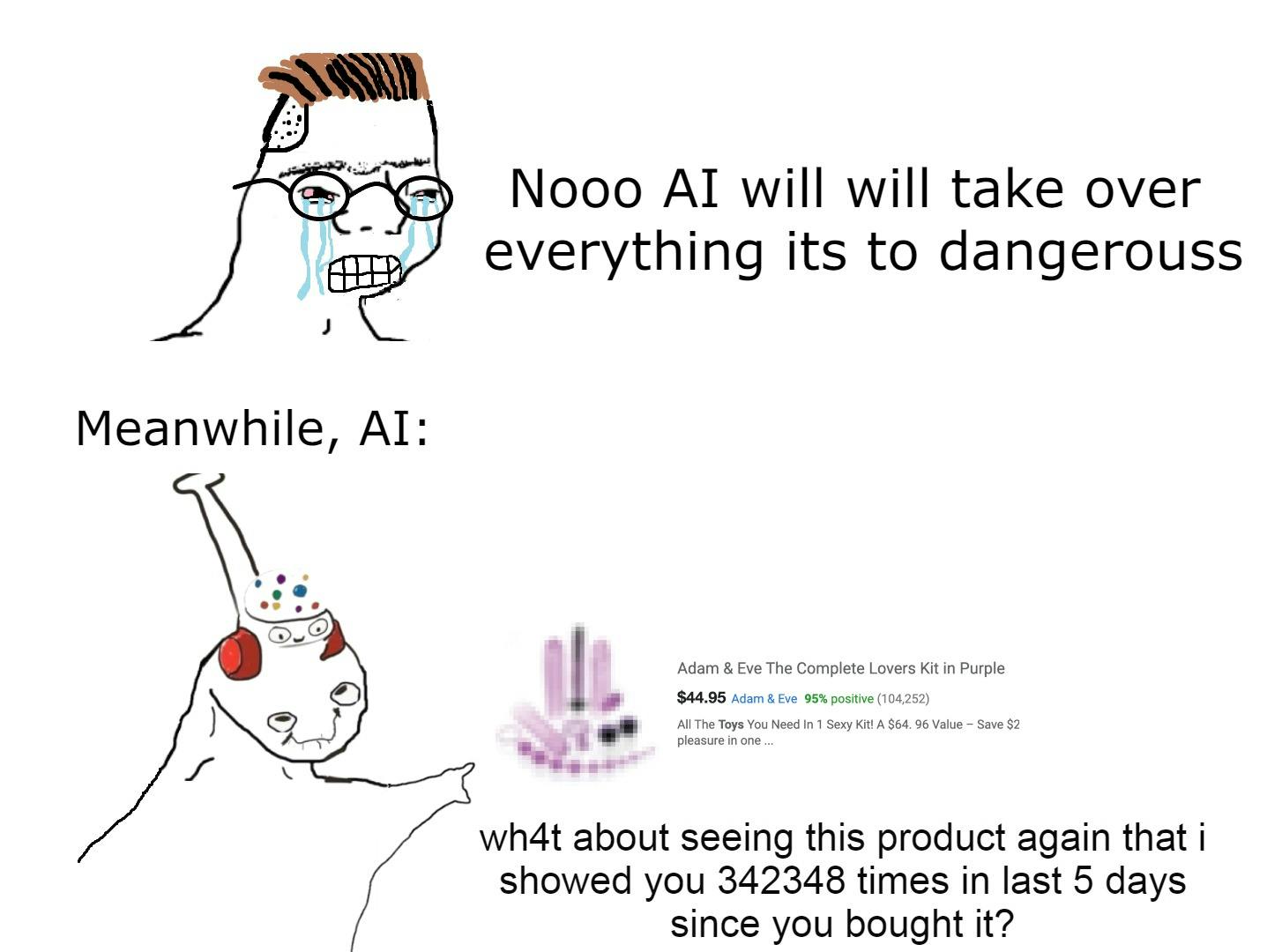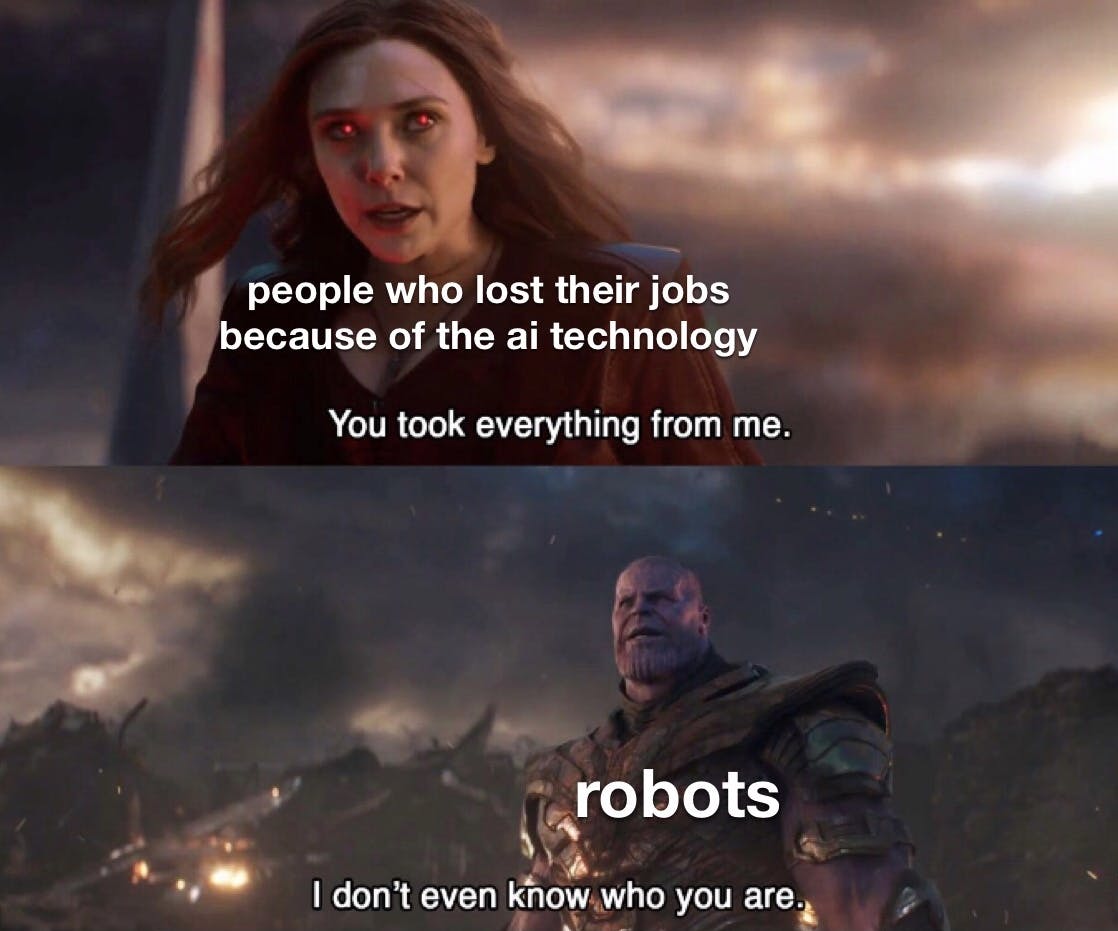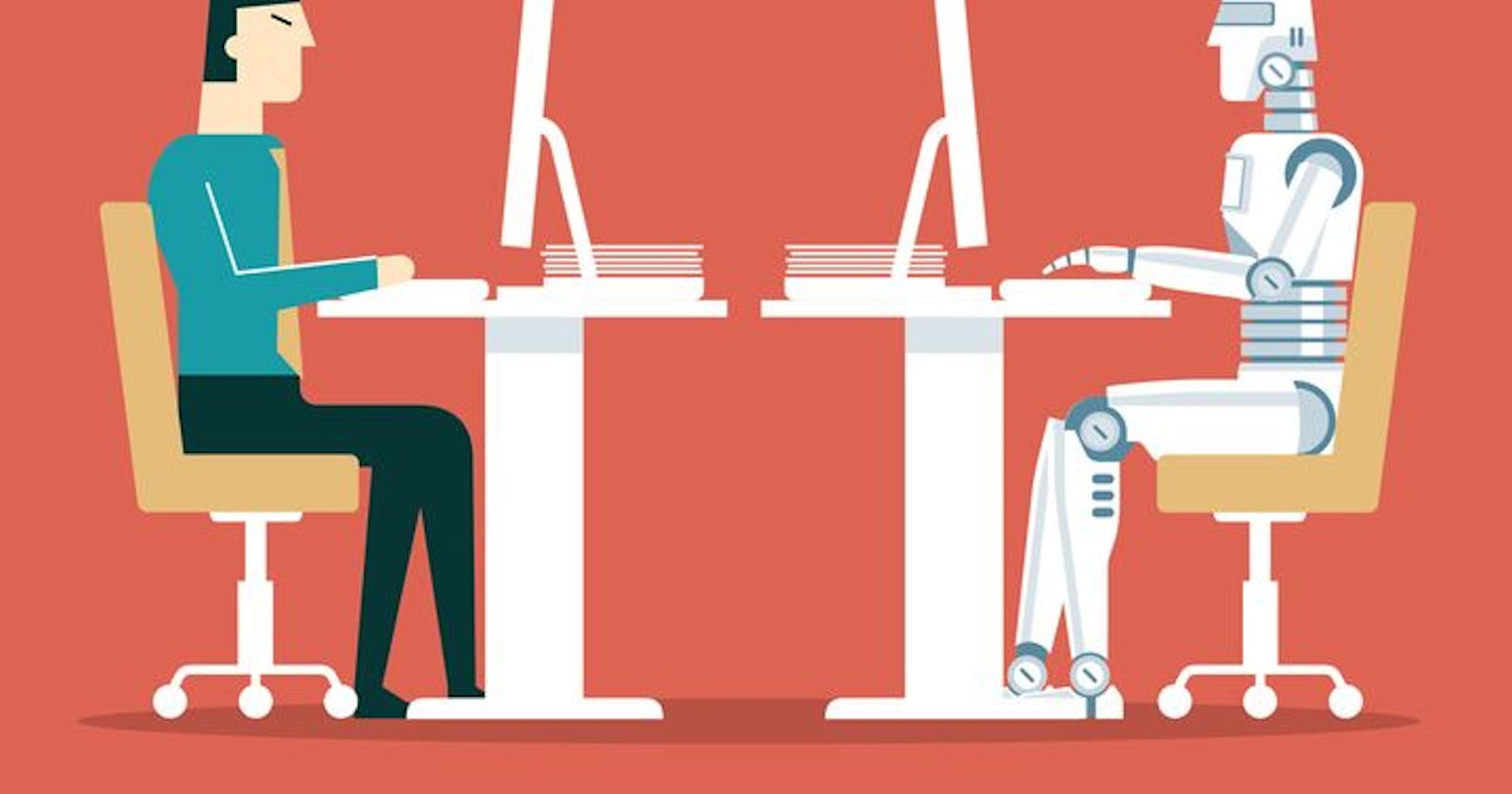The robots are coming for your job.
We’ve heard it hundreds of times — but is it true? Well, it depends on the nature of the job in question, and how far ahead into the future we look. In this blog post, we'll explore the potential impact of AI on jobs and what it could mean for the future of work. So fasten your seat belt and let's deep dive, into the blog.
As of a 2020 report by Statista, 54% of business and HR leaders worldwide claim they expect AI will have an impact on the nature of jobs in their organisation over the next three years — though they believe the number of jobs will remain the same. 25%, however, believe that AI will create a net decrease in jobs — while 12% believe AI will increase.

Introduction🐱🏍:
First, it's important to understand that AI is a broad term that refers to the development of computer systems that are capable of performing tasks that normally require human intelligence, such as learning, decision-making, and problem-solving. There are many different forms of AI, including machine learning, natural language processing, and robotics, and they are being used in a variety of industries, including healthcare, finance, and manufacturing.
Artificial intelligence (AI) has the potential to revolutionize the way we work and live. While some people are excited about the possibilities that AI brings, others are concerned about the impact it could have on jobs. In this blog post, we'll explore the potential impact of AI on jobs and what it could mean for the future of work.
What peoples believe about Artificial Intelligence🤔:

One of the primary concerns about AI is its potential to replace human jobs. Some people believe that as AI becomes more advanced, it will be able to automate many tasks that are currently performed by humans, leading to widespread job displacement. While it is true that some jobs may be replaced by AI, it is unlikely that AI will completely replace human jobs. Instead, it is more likely that AI will augment and enhance the capabilities of humans, allowing us to perform tasks more efficiently and effectively.
There are already many examples of how AI is being used to augment human work, such as in the field of medicine where AI is being used to analyze medical images and assist with diagnosis, or in manufacturing where AI is being used to optimize production processes.
Artificial Intelligence taking jobs 🐱💻:

According to a widely-commented study on the future of employment, now known as the Oxford Study, about 47% of total US employment is at risk due to rapid computerization.
"Will my job be replaced by a robot?”
This question is becoming more and more valid for most professions. It is a racial problem too.
As Alana Semuels from Time notices, many people of colour and low-wage workers lost their jobs due to the COVID-19 pandemic. She points out that they were primarily, “cashiers, food-service employees, and customer service representatives, which are among the 15 jobs most threatened by automation.” Now, they have problems with getting employed again.
Incidentally, the very same jobs top our list of the professions most likely to be taken over by AI.
Some 65% of our respondents suspect they could lose their jobs to AI in the next few years. And nearly 79% believe that rapid automation is an important issue that we should be particularly concerned about.
There certainly will be job disruption. Because what’s going to happen is robots will be able to do everything better than us.
Real-world AI solutions
Common use cases for AI include customer service chatbots. They use machine learning and natural language processing (NLP) to identify message intent. Chatbots can instantly analyze messages and provide quick answers to common questions. Companies use them to save money and improve the customer experience.
According to a survey Police officers, doctors, and lawyers have been voted professions that will survive the AI revolution. Professions typically associated with creativity appear to be even less vulnerable to the disruptive effects of AI technology on the job market. Artists and musicians were selected by almost 39 and 36% of respondents respectively as the jobs least likely to be taken over by artificial intelligence.
Ways in which artificial intelligence (AI) could impact the future of work🤖:

- "AI, making humans obsolete since forever" pokes fun at the idea that AI will eventually replace humans in many tasks and potentially make human labor unnecessary😂.
1. Increased productivity:
AI has the potential to automate many tasks that are currently performed by humans, which could increase productivity and efficiency. For example, AI could be used to analyze data and make predictions, freeing up human workers to focus on more high-level tasks.
It’s human nature to learn, evolve, and improve. Since the beginning of time, we have progressed to a better future. Humans have come a long way from using stones to create fire to telling a virtual assistant to turn on or off the electrical equipment. Some will say machines have taken over and bots have replaced humans — but we’re the ones steering this ship.
2. Changes in the types of jobs:
As AI becomes more prevalent, it could lead to the creation of new types of jobs that require skills in areas such as machine learning and data analysis. At the same time, it could lead to the obsolescence of certain types of jobs that are easily automated.
Based on the nature and type of these jobs, here is a rundown of the jobs that AI machines are most likely to perform in the future:
Customer service executives
Bookkeeping and data entry
Receptionists
Proofreading
Manufacturing and pharmaceutical work
Retail services
Market research analysts
3. Increased demand for skilled workers:
As AI becomes more integrated into the workplace, there will likely be an increased demand for workers who have the skills to work with and manage AI systems. This could include workers with expertise in areas such as machine learning and data analysis, as well as those with strong communication and problem-solving skills.
This change is driving both companies and employees to advance their skills. The fear of losing jobs because of the new automation trend will fade out if one focuses on fixing their skills gaps through 'training'.
Training must become a regular part of every employee's career growth. Such intervention will not only prevent employees from losing their jobs but will also help them climb up the career ladder.
4. Changes in the nature of work:
AI could change the way that work is organized and performed. For example, it could lead to more flexible and remote work arrangements, or it could lead to the development of new business models.
On the other hand many of the people thinks that AI could take over the humanity.
AI will probably not make human workers obsolete, at least not for a long time
Given how artificial intelligence has been portrayed in the media, in particular in some of our favorite sci-fi movies, it’s clear that the advent of this technology has created fear that AI will one day make human beings obsolete in the workforce. After all, as technology has advanced, many tasks that were once executed by human hands have become automated. It’s only natural to fear that the leap toward creating intelligent computers could herald the beginning of the end of work as we know it.

5. Ethical considerations:
The adoption of AI in the workplace raises a number of ethical considerations, including issues related to privacy, bias, and accountability. It will be important for organizations and society as a whole to address these issues in a responsible and ethical manner.
Conclusion(Personal Opinion) 👀:
The impact of AI on jobs is a complex and multifaceted issue. While it is likely that some jobs will be replaced by AI, it is also likely that AI will create new job opportunities and enhance the capabilities of human workers. By investing in education and training, and by adapting to the changing nature of work, we can ensure that the benefits of AI are shared by all members of society.
Overall, it is clear that AI has the potential to significantly impact the future of work. While there are some potential risks and challenges, there are also many opportunities for individuals and organizations to harness the power of AI to drive innovation and improve the way we work and live.
